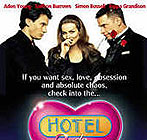|
|
|
|
Hotel
De Love
|
 |
|
Back in the deepest troughs of local production in the mid 1980s, one often heard the cynics of the scene grumble a familiar litany of disenchantment: Australians are just no good at making comedies, romances, or just about any film in a Hollywood-style genre that requires verve, élan and a lightness of touch. Hotel De Love causes an instant flashback to those dark times. It is a strenuous, ugly, unfunny film lacking any genuine spirit of the romantic comedy genre. Everything in it reeks of a particularly uninspired form of commercial calculation. These days, romantics in movies tend to walk around with elaborate theories about what love is and how to find it. In Hotel De Love twin brothers Rick (Aden Young) and Stephen (Simon Bossell) both fervently believe in true love at first sight. Their mutual object of desire, Melissa (Saffron Burrows), puts her faith in rationality and civility, which is why she is about to marry a lifeless intellectual, Norman (Peter O'Brien in a truly thankless role). Despite the ceaseless, unconvincing patter about love and its vicissitudes, writer-director Craig Rosenberg presses mainly for slapstick: a great deal of manic running, falling, flailing and dancing. When this fails to raise a laugh – which is mostly the case – only the hyper-kitsch sets of Rick's honeymoon hotel and Alan Hopgood's grating piano-bar songs provide a dry chuckle or two. Performances are pitched broadly. Bossell, in particular, is encouraged to indulge in an orgy of twitching, grimacing and squeaky talking that is painful to behold. Only Young and Pippa Grandison (as a winsome astrologist) emerge from this mess with any dignity intact. For some unfathomable reason, Australian movies are often betrayed by the gross inexactitude of their cultural references. In Hotel De Love, for instance, we are asked to believe that Melissa is a Philosophy Professor at Monash University – she occasionally dangles a copy of Wittgenstein from her hand – and that unsophisticated characters woo each other by quoting Paul Éluard's surrealist poetry! (A clip from Alphaville [1965] might have helped?) This is an object lesson in filmmaking gone horribly wrong. In the context of the Australian movies of 1996, Hotel De Love indeed makes Love and Other Catastrophes (1996) look like the Citizen Kane of twentysomething romantic comedies. But in the decade following it, a film made by a Love and Other alumnus, Stavros Kazantzidis, actually managed to outdo Hotel De Love in the gross-ugly-awful department: Horseplay (2003). That is some kind of achievement. © Adrian Martin December 1996 |
![]()